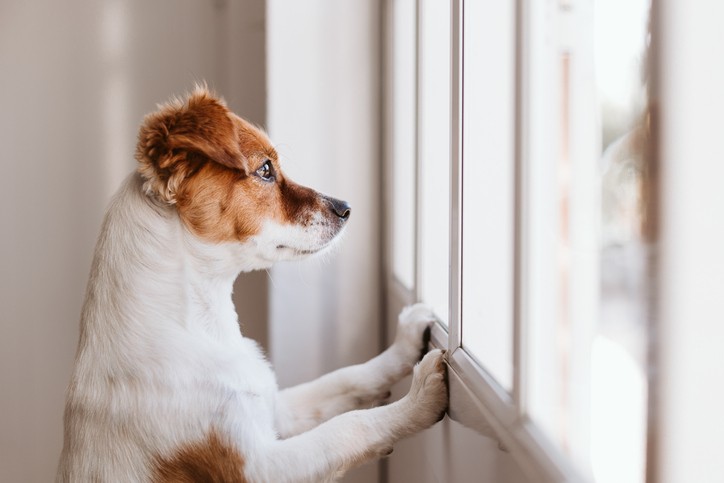
Does Your Dog Have Separation Anxiety? Here’s 5 Tips to Help
Did you know dogs can have separation anxiety? Do you think this is a possibility for your canine companion? Separation anxiety in dogs is not uncommon at all, and dogs who get to spend a lot of time with their human family members already are even more prone to dealing with this issue.
If you think your dog could have separation anxiety, look for signs that he is more upset or anxious than normal when no one is home. If he has frequent potty accidents when left alone (with no medical reason), if he destroys the furniture, or if he howls and barks the moment he realizes no one is home, these are all signs he may have separation anxiety.
Read through the article below to get some suggestions that may help you deal with your anxious dog moving forward. With the right plan, you can help train your dog to stay calm when he’s by himself.
1. Retrain Your Dog’s Cues
First, it’s important to make sure your dog doesn’t have cues that he associates with you leaving home. If you pick up your keys or put on your shoes before you go outside, these are cues that may cause your dog to become extremely anxious the moment you begin performing them.
Try going through your leaving routine but then sitting down to watch TV or have a snack before you go. This way, your dog will eventually learn to understand that these cues don’t mean immediate anxiety for him, and he will remain calmer when you do leave.
2. Practice a Little at a Time
Start slowly. With dogs who are very anxious, you may need to simply try stepping into another room or going out on the porch for a little while before you can work up to leaving home. Start with just five minutes of alone time for your dog, then add a few minutes slowly until he gets the hang of being on his own.
For the first few stages of this method, try going outside your home where your dog can’t see you, but you can still hear whether he’s howling or barking. This way, you’ll know if he’s settling down or not.
3. Give Lots of Treats
While practicing leaving your dog alone, make sure you give him plenty of treats when he’s doing the right thing. If he stays quietly in another room or in his crate for a short period of time, even without seeing or hearing any of his human family members, give him a treat for his good behavior.
Over time, you can increase the length of time he must be quiet before he gets a treat. Eventually, he should be able to stay quiet for a long while through this training method.
4. Exercise Your Dog Physically and Mentally
Make sure your dog has lots of physical exercise before he will be left alone, so he’ll be more likely to go to sleep when he’s by himself. Additionally, giving your dog mental stimulation can help him stay calmer and rest more easily when he’s on his own.
You should also consider training your dog with basic commands such as sit, stay, lay down, and more. This way, he has something to think about and practice while he’s with his human family, and he can use his brain even more.
5. Talk to Your Vet
If all else fails, and if your dog is still extremely anxious even after you try the methods above for a while, you may need to talk to your veterinarian for more assistance. The vet may be able to prescribe an anxiety medication for your dog that helps him stay calmer on a regular basis.
You may also be able to get a prescription for a short-term medication if you know you’ll be out of town for a while, leaving your dog alone for longer stretches of time than normal. Your vet can give you more information about this possibility as well.
Finding the Solution for Your Dog’s Separation Anxiety
As you can see, it takes time, effort, and a lot of work from you and your pet both to get over the hurdle of dog separation anxiety. However, it is entirely possible to help your dog recover from this issue and encourage him to remain calm and content, even when his human family isn’t at home with him.
Even dogs who are extremely anxious when left alone may respond well to one or more of the options on the list above. If possible, try other methods before talking to your vet about medication, as medicating your dog may be a lifelong requirement without other behavioral assistance. Your vet can give you more information about your pet’s specific needs and help you come up with the right plan of action to help your dog in the future, too.
Talk with your Boston Veterinary Clinic veterinarian about your dog’s separation anxiety by booking an appointment online!